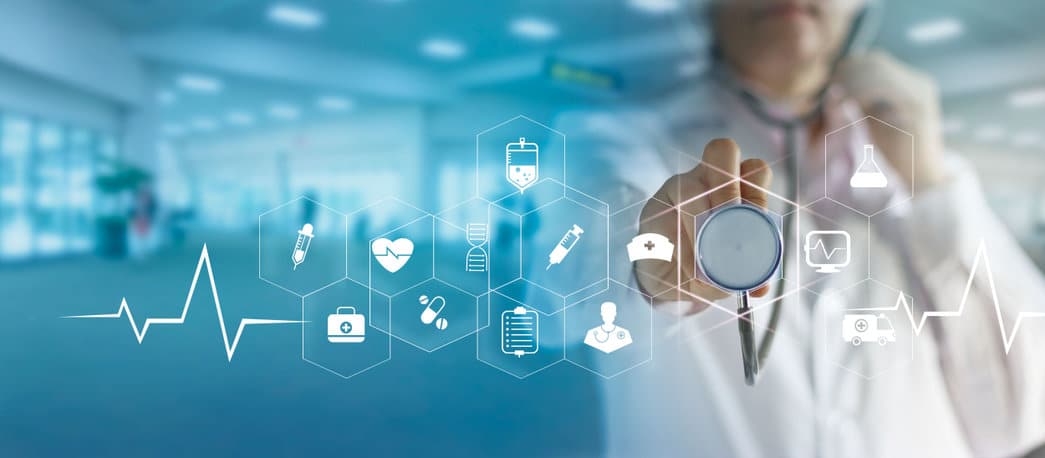
HealthIT.gov defines an electronic health record (EHR) as a “digital version of a patient’s paper chart . . . real-time, patient-centered records that make information available instantly and securely to authorized users.” An EHR system therefore includes a broad range of patient-specific data along with decision making tools for healthcare providers that streamline workflows.
In the American Recovery and Reinvestment Act of 2009, healthcare organizations that wish to qualify for Medicare and Medicaid incentive payments must use EHR software that complies with United States Department of Health and Human Services (HHS) standards—which is a key reason why using an EHR system is vital for today’s healthcare organizations in the United States.
Read on as we delve into what is required for an EHR software to comply and be considered a qualified system along with other reasons why EHR technology is important. Plus, we’ll contrast EHR technology with PHR and EMR systems.
Deeper Look at EHR Technology
Only certain technologies can be considered a qualified EHR, according to HHS. The definition of a qualified EHR is listed in the Public Health Services Act and reads as follows:
[A]n electronic record of health-related information on an individual that: (A) include patient demographic and clinical health information, such as medical history and problem lists; and (B) has the capacity: (i) to provide clinical decision support; (ii) to support physician order entry; (iii) to capture and query information relevant to healthcare quality; and (iv) to exchange electronic health information with, and integrate such information from other sources.
Systems that qualify include these, among others:
In addition to the crucial benefit of allowing healthcare systems to receive Medicare and Medicaid incentives, more benefits exist for using EHR systems.
Benefits of EHR Systems
EHR applications can be shared with providers across healthcare organizations, including specialists, medical imaging centers, laboratories, pharmacies, clinics, emergency care facilities, and more. This means that a patient’s electronic health record can contain crucial data from all professionals involved in their care—which paves the way for safer, well coordinated, higher quality patient care.
HealthIT.gov offers insights into significantly more EHR benefits, which include:
- More effective diagnoses
- Reduction in medical errors
- Improved communication
- Enhanced convenience
- Comprehensive, legible documentation
- Streamlined coding and billing
- Improved security
- Reduced paperwork
- Lowered testing duplication
EHR systems, overall, help healthcare organizations to provide enhanced patient care while also meeting business goals more effectively and cost-efficiently.
EHR Versus PHR Technology
Personal health record (PHR) technology that’s “tethered” is a subset of an EHR system, referring to the portion of the application that patients can securely access. It can be referred to as a “patient portal.” Patients can use connected PHR apps to find test results and other health-related information; communicate with their healthcare providers; and otherwise have access to healthcare services.
Note that stand-alone PHR systems exist that aren’t connected to EHR technology. In this case, a patient can provide information from their medical records that will be stored and made available to healthcare providers, as needed. This is much less robust than tethered PHR.
EHR Versus EMR Technology
Some people use the term “electronic medical record” interchangeably with an “electronic health record”—and use the acronyms of EMR and EHR as if they’re the same technology. That’s also why we sometimes use terms like “EMR consulting” and “EMR consultants” on our website.
EHR and EMR technology, though, is significantly different in capability. EMRs are digitized versions of a patent’s paper chart within a practice. So, within a particular practice, this provides benefits, such as the ability to manage a person’s appointments, keep track of their prescriptions, watch health trends over time, and so forth—and EMR consultants can help with this kind of setup.
When patient information needs to be transferred to another medical professional or facility, though, the records often need to be printed out and mailed—which is much less secure and convenient, and negates many of the real-time benefits of EHR systems. EHR systems are more holistic and all-encompassing, and this technology can be made available between and among healthcare systems. It can help to think of EHR systems as today’s “smart” technology as compared to the more static EMR systems of the past.
So, the systems are different with EHR applications leveraging the latest of today’s technology while the terms are still often used interchangeably. That’s why agencies that provide experts to help healthcare facilities to transition from an EMR system to an EHR one are called sometimes EMR consulting companies (because that’s the system being transitioned from) or EHR consulting companies (because that’s the system being transitioned to). Or, sometimes agencies are called EMR consulting companies rather than EHR consulting companies simply because the terms are being used interchangeably.
Comparing EHR Consulting Companies
Whether your healthcare organization is upgrading to an EHR system for the first time or is switching applications, it’s important to choose the right consultants. To make that happen, work with an EHR consulting company with a broad network of professionals with expertise in your application of choice.
EHR consultants sometimes offer more general services, such as helping companies to select the right software or to manage their project. Other times, they have targeted niches: implementation, integration, and/or optimization; training and process documentation; data cleaning, migrating, and transitioning; go-live services; and post-live support to name some of the more in-demand specialties. Some consultants focus on one particular EHR while others have a broader set of application expertise.
What’s most important is to get the right consultants for your EHR implementation. This involves an analysis of your in-house IT team along with their specialties and bandwidth. If you find skill gaps or discover that adding your EHR implementation to their workload would over-extend them, that’s not unusual. That’s where HealthTECH Resources comes in, supplementing your team with professionals of unsurpassed quality. Or, if you’d like, we can help with the analyses and then augment your staff based on what we discover together.
Contact HealthTECH Resources
To get started with right-sizing your EHR team, please contact us online or call (602) 903-7961. Our experienced, boutique-style agency can provide the experts you need as consultants, contract-to-hire professionals, or permanent placements. We respond quickly, even to stringent requests, often getting professionals on-site within 48 hours.

PRESIDENT/CEO AT HEALTHTECH RESOURCES
Larry has specialized in building strategic healthcare relationships for over 25 years, helping the nation’s top payors and providers solve some of their most pressing business challenges through an intelligent mix of staffing services, training, and consulting.
